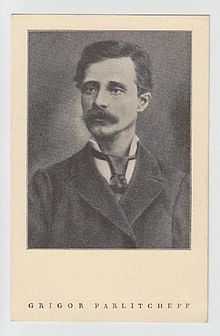Grigor Parlichev

Parlichev studied in a Greek school in Macedonia. In the 1850s he worked as a teacher of Greek in the towns of Tirana, Prilep and Ohrid. In 1858 Parlichev started studying medicine in Athens but transferred to the Faculty of Linguistics in 1860. The same year Parlichev took part in the annual poetic competition in Athens winning first prize for his poem "O Armatolos" (Ο Αρματωλός, in Bulgarian "The Serdar"), written in Greek. Acclaimed as "second Homer", he was offered scholarships to the universities at Oxford and Berlin but declined both.
In 1862 Parlichev joined the struggle for independent Bulgarian church and schools, though he continued to teach Greek. After spending some time in Constantinople in 1868 acquainting himself with Old Slavonic literature, he returned to Ohrid where he advocated the substitution of Greek with Bulgarian in the town's schools and churches. The same year Parlichev was arrested and spent several months in an Ottoman jail after a complaint was sent by the Greek bishop of Ohrid.
From 1869 Parlichev taught Bulgarian in several towns across Ottoman Empire, including Struga, Gabrovo, Bitola, Ohrid and Thessaloniki. He studied at the Bulgarian Men's High School of Thessaloniki. In 1870 Parlichev translated his award-winning poem "The Serdar" into Bulgarian in an attempt to popularize his earlier works, which were written in Greek, among the Bulgarian audience. He also wrote another poem "Skenderbeg", and his autobiography.
From this time until his death Parlichev continued writing only in Bulgarian, publishing a number of poems and newspaper articles and an autobiography (1884). Parlichev was the first Bulgarian translator of Homer's Iliad, though critics were highly critical of his style and choice of dialect. In translating the Iliad, Parlichev was among the first authors to write in his native Ohrid dialect. He is therefore also regarded as a founding figure of the literature of the later standardized Macedonian language.[8]
Parlichev's son Cyril Parlichev was also a prominent member of the revolutionary movement in Macedonia and a Bulgarian public figure.
References and notes
- ↑ "Language and national identity in Greece, 1766-1976, Peter Mackridge, Oxford University Press, 2009, ISBN 0-19-921442-5, p. 189". Books.google.com. Retrieved 2013-11-18.
- ↑ Detrez, Raymond (2007). Canonization through Competition: The Case of Grigor Părličev (part of the "Literature Thoughts collection"). Literature institute. pp. 57–58.
- ↑ Becoming Bulgarian: the articulation of Bulgarian identity in the nineteenth century in its international context: an intellectual history, Janette Sampimon, Pegasus, 2006, ISBN 9061433118, pp. 61; 89; 124.
- ↑ Григор Пърличев, Автобиография, "Избрани произведения", Бълг. писател, София, 1970, гл. 16. Parlichev, G., Autobiography .
- ↑ "Macedonia and Greece: The Struggle to Define a New Balkan Nation, John Shea, p. 199". Books.google.mk. Retrieved 2013-11-18.
- ↑ "Gligor Prlicev". Cs.earlham.edu. Retrieved 2013-11-18.
- ↑ Prlicev and Sazdov, Gligor,Tome. Izbor. Matica. ISBN 978-86-15-00214-5.
- ↑ L. M. Danforth: The Macedonian Conflict: Ethnic Nationalism in a Transnational World, Princeton University Press 1995, p.50, 62.
